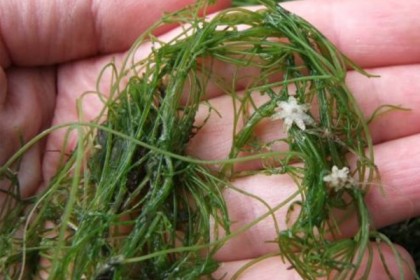
Starry Stonewort is a bushy, bright green algae that produces star-shaped bulbils. Left unchecked, it can create large dense mats in lakes. (Invasive Species Center)
Local volunteers are needed on Saturday, Aug. 9, to help search for starry stonewort, an aquatic invasive algae that can spread easily and form dense mats in lakes.
The event is being held in cooperation with the Prior Lake-Spring Lake Watershed District, University of Minnesota and the Minnesota Aquatic Invasive Species Research Center. Sand Point Beach Park in Prior Lake will be one of 23 training sites being hosted around the state. Volunteers will meet at their local site for training, and will then be sent to nearby public water accesses to check for starry stonewort. At the end of the day, they’ll return to the local training site to report their findings. For a full list of the sites and other FAQs, visit starrytrek.org.
Starry stonewort was first discovered in Minnesota at Lake Koronis in 2015 and has since spread to thirty lakes across the state. Early detection is crucial for managing this species. Starry Trek volunteers have already identified starry stonewort in four lakes and found other AIS such as Eurasian watermilfoil and zebra mussels, during this event.
No experience or equipment is necessary to participate in the volunteer activity. Expert training on monitoring protocols and starry stonewort identification will be provided on-site. This event is free, but registration is required. Children under 18 must be accompanied by a parent or legal guardian.
“We’re delighted to be partnering with the Minnesota Aquatic Invasive Species Research Center for this event,” said Danielle Studer, Water Resources Specialist at Prior Lake-Spring Lake Watershed District. “Preserving our lakes for future generations is crucial, and we are committed to doing everything possible to prevent the introduction and spread of aquatic invasive species (AIS).”
The Minnesota Aquatic Invasive Species Research Center works across the state to develop research-based solutions that can reduce the impacts of aquatic invasive species. A portion of the funding for this program is provided by the Environment and Natural Resources Trust Fund, as recommended by the Legislative-Citizen Commission on Minnesota Resources.
For more information on the event, contact Studer at (952) 440-0069 or email: dstuder@plslwd.org